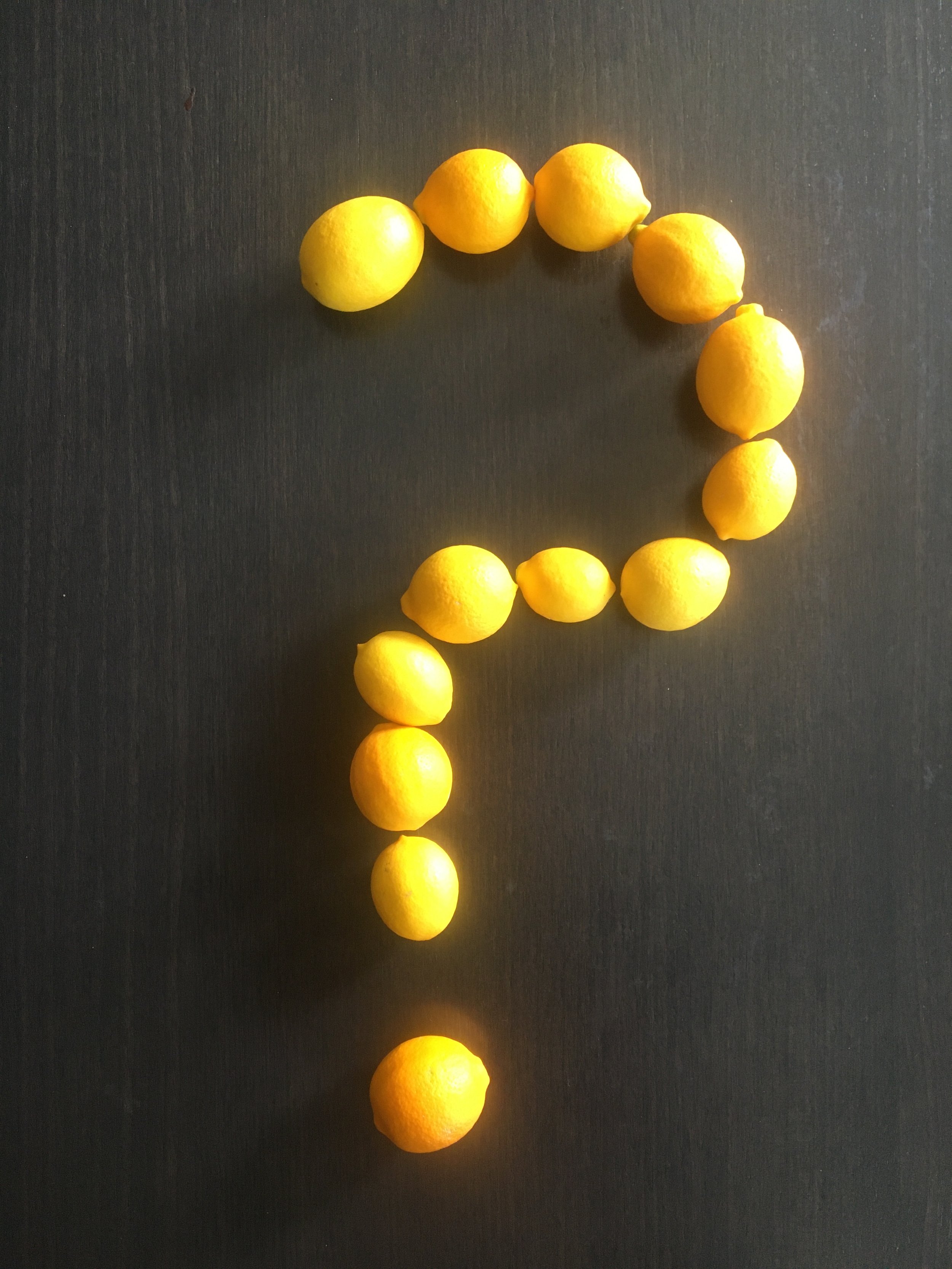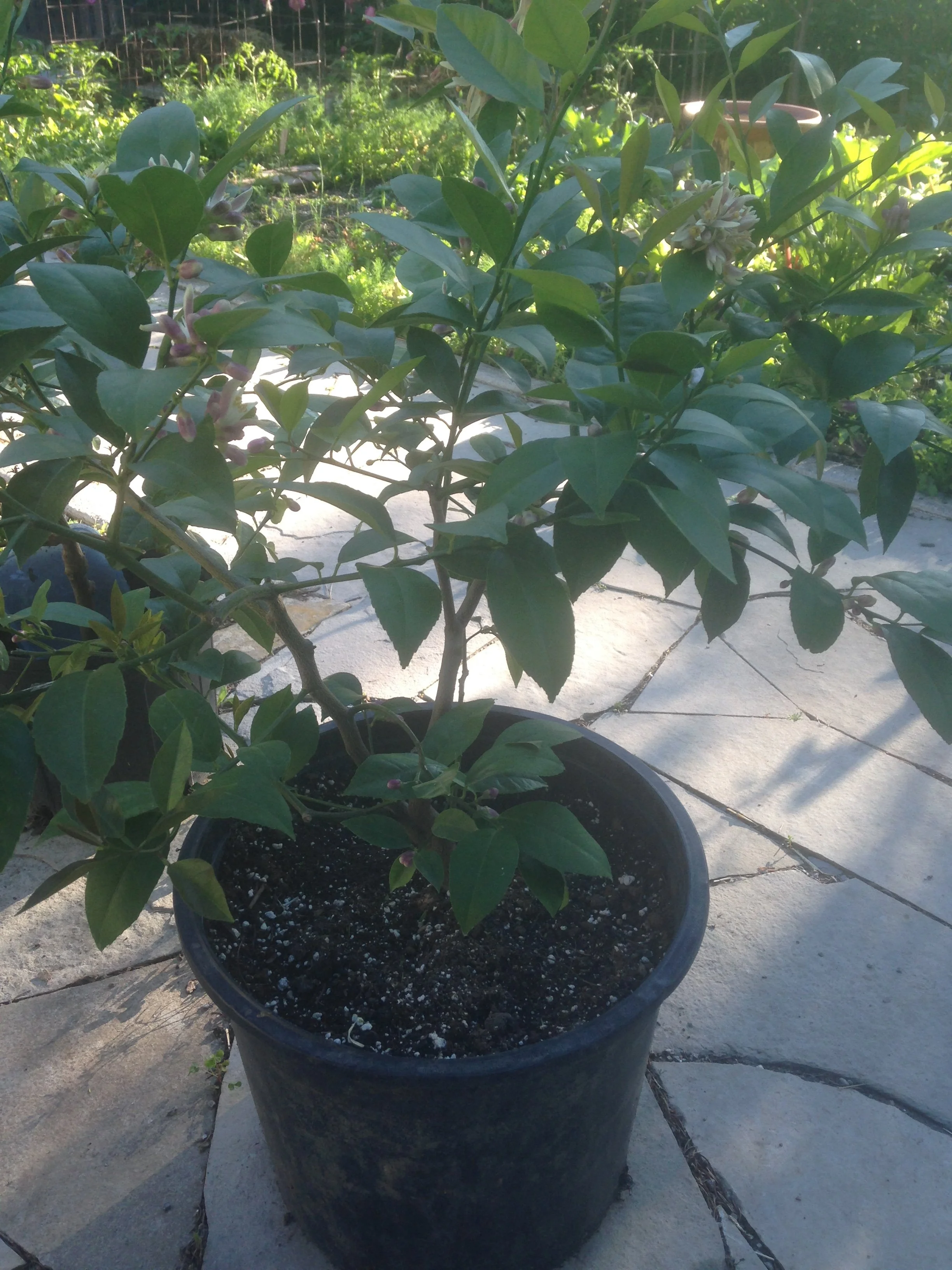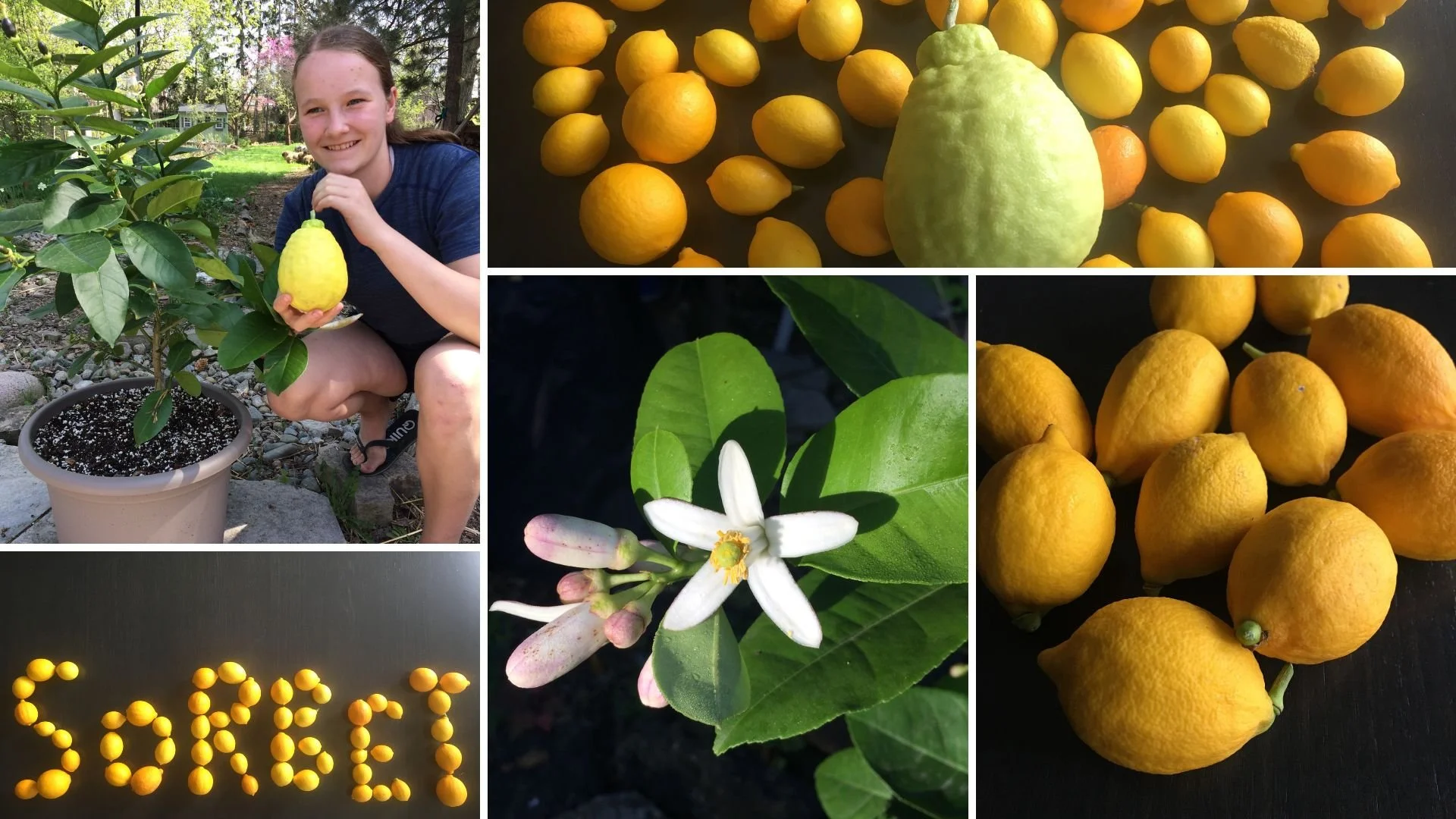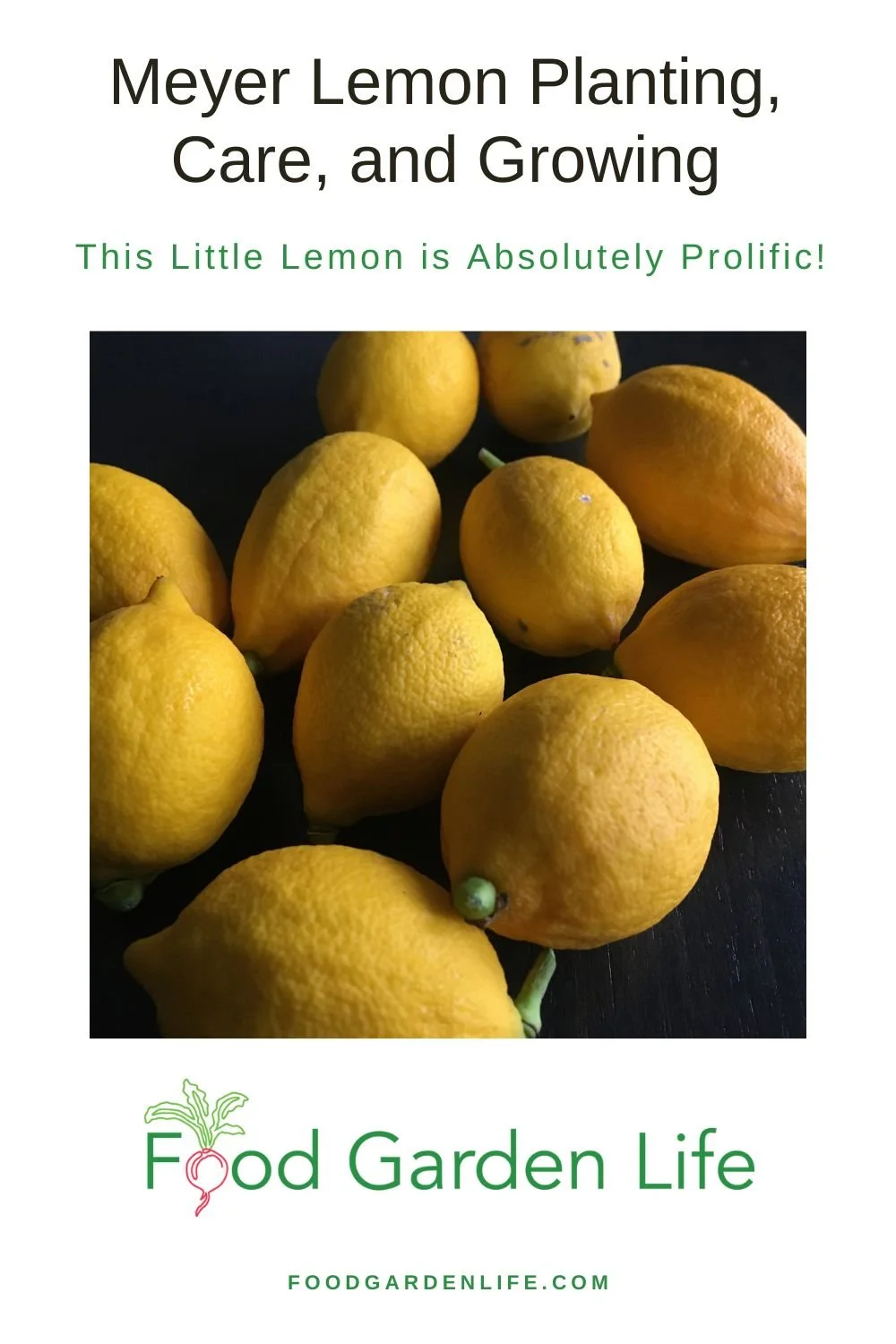By Steven Biggs
This Little Lemon is Absolutely Prolific!
50 Meyer lemons on a knee-high bush.
The branches hung to the ground under the weight of the fruit. The bush was yellow with fruit. Not a single branch broke under the weight of the fruit. Meyer lemon trees are work horses. If you want to grow your own citrus, it's what I recommend starting with.
'Meyer' lemon (Citrus x meyeri) is the lemon that's not fully a lemon.
It's a hybrid between a lemon and an orange or mandarin orange. While the leaves of Meyer lemon trees look like true lemon leaves, the fruit are thin-skinned, taking on an orange tinge as they ripen.
I love the mild taste of the fruit and the distinctive smell of the rind. It makes an unbeatable sorbet.
Here's my Meyer lemon sorbet recipe.
Lemons and Meyer Lemons are the fruits I recommend for first-time home citrus growers. They're the gateway citrus trees. They're easy to grow, and have a better chance of ripening in the short summers we get in cold climates.
Here are more reasons that lemons are a good choice for gardeners in cold climates.
Learn How to Easily Grow Meyer Lemon Trees in Pots
Meyer lemon trees are a great choice for cold-climate gardeners who want an exotic crop. They have a compact, bushy form that makes them suitable for growing in a pot, and they're quite cold hardy—more cold hardy than true lemons. (See more about hardiness below.)
In northern gardens Meyer lemon is usually grown as a potted plant...but there are gardeners pushing the boundaries in warm zones.
Potted Meyer Lemon Size
This potted Meyer lemon is pruned into a bush form to keep it compact.
When it comes to the size of the plant, you’re the boss. You control plant size with pot size and pruning. Think of bonsai, where a decades-old tree is only knee high.
The other thing that affects size is the rootstock; some types of rootstock are dwarfing and keep a tree smaller. Meyer lemon trees sold in garden centres are often on dwarfing rootstock.
Meyer Lemon Tree Care
While it's outdoors over the summer, keep your Meyer lemon tree in a sunny location.
As with any potted plant, your pillars of success are:
Suitable pot size
Good potting soil
Regular feeding
Proper watering
If you get these four things right, you'll keep your Meyer lemon tree happy.
Here's a full guide to growing a potted lemon tree year round and getting the conditions right.
Find Out How to Grow Your Own Lemons
Harvest more lemons this year. Grow Lemons in Cold Climates Masterclass shows you how to grow a lemon tree in a pot or outside with protection. And get lemons!
Watering a Meyer Lemon Tree
When it comes to watering Meyer lemon trees, more is NOT better.
Meyer lemon trees hate wet feet. That's another way of saying that when the soil is constantly wet, the roots can die.
I aim to keep the soil of my potted Meyer lemon trees on "the dry side of moist." Keep the soil moist but not soggy.
If you're in doubt, wait another day before watering. Lift up small potted lemon trees and let the weight help you gauge how dry the soil is.
Find out more about how to water a lemon tree so that it thrives.
Feeding
Potted lemon plants must be fed! There's a small volume of soil feeding the whole plant.
Start feeding in the spring, when new growth begins. Cut back on feeding in late summer as cooler temperatures and less light cause plant growth to slow.
There are many fertilizing products on the market. And each lemon grower has a favourite formula.
Not sure where to start?
Look for “all-purpose” or “general-purpose” product. Make sure it has micronutrients
Decide what suits your style of gardening (do you want to mix solutions regularly – or apply slow-release fertilizer granules just once in the spring)
Find out more about feeding and micronutrients in this article.
Repotting Meyer Lemon Trees
Mature Meyer lemon trees don’t need to be repotted annually. Just replace the top few centimetres of soil every couple of years. Faster growing young Meyer lemon trees can be moved to a bigger pot each year if the roots have filled the current pot.
Soil structure breaks down over time, so you will eventually want to repot mature Meyer lemon trees in new potting soil.
Meyer Lemon Tree Pollination
Meyer lemon flowers have both male and female parts and are “self-fertile.” That means you don’t need pollen from a different lemon tree for a Meyer lemon tree to bear fruit.
If the plant is outdoors over the summer, insects and wind move the pollen. You don't have to help with pollination.
Pollinate flowers on lemon trees growing indoors using a small paintbrush.
Find Out How to Grow Your Own Lemons
Harvest more lemons this year. Grow Lemons in Cold Climates Masterclass shows you how to grow a lemon tree in a pot or outside with protection. And get lemons!
Propagating Meyer Lemon Trees
Growing Meyer lemon trees from seed is easy...but be prepared to wait years for fruit. That's because seed-grown plants go through a juvenile stage before they begin to flower and fruit.
To get fruit more quickly, buy a plant, or root a cutting from a mature plant. (Meyer lemon trees grow well on their own roots, so it's not necessary to graft them.)
Meyer Lemon Challenges
Insect Pests
Outdoors, pest problems are usually minimal. It's when a potted Meyer lemon tree is indoors for the winter that you're more likely to encounter pests. Two common pests are scale and spider mite.
Watch for spider mites when overwintering lemon plants indoors at room temperature. That’s because spider mites do well in the dry air in centrally heated homes.
Find out more about controlling scale and spider mite on lemon trees.
Leaf Drop
Leaf drop is common when Meyer lemon trees are brought into warm, centrally heated homes
On more than one occasion, I’ve had a naked Meyer lemon in my kitchen over the winter. It reminded me of the Grinch's Christmas tree!
When Meyer lemons are brought into the house in the autumn, expect leaves to drop. It's normal. The warm, dry air in centrally heated homes is not ideal.
If you want less leaf drop, cool, bright overwintering locations are ideal. (See below for ideas.)
Fruit Drop
Some fruit drop is normal when the fruit are still pea-sized. If only a few little lemons drop, it's nothing to worry about.
If all the fruit drop off, that's not normal. Two common causes are poor pollination and not enough water.
Meyer Lemons Over the Winter
Meyer Lemon trees are evergreen and keep leaves through the winter. (As I note above, if your plant is unhappy in the house, it might drop quite a few leaves.)
Meyer lemon plants tolerate more cold than many people realize (see below). When they are in cold conditions, they also tolerate darkness, because the plant stops growing.
Cold Tolerance
Meyer lemon is hardy to about -6°C (21°F). Hardiness is never exact, so expect younger growth to be more tender and susceptible to cold.
But the important temperature to remember is the temperature at which the fruit is at risk of freezing, around -3°C (27°F)
Indoors
Consider moving Meyer lemon trees indoors earlier rather than later, so there is less of a drastic change in temperature and humidity. This helps to minimize leaf drop.
While the fragrance of the flowers makes it nice to have Meyer lemons in a bright kitchen or living room window, you might have other options:
What about a cool, bright attic window?
A cool sunroom with a temperature just above freezing
A cold, dark garage or shed
Find out more about how cold a lemon tree can get during the winter.
Indoors – Care over Winter
Keep soil on the dry side of moist
Too much water can rot the roots
Higher humidity helps minimize leaf drop and make conditions less suited to spider mites
Watch for scale and spider mites
Meyer Lemon FAQ
Why is my potted Meyer lemon tree turning yellow?
There are a few things that can cause this. It could be not enough nutrients in the soil. It could also be that the soil is too alkaline, so that plant can't take up the nutrients that are in the soil. But another common cause is overwatering—which kills the roots and sends the tree into a downward spiral.
What time of year do you repot Meyer lemon?
The best time to repot Meyer lemon is in the spring, just before new growth begins.
Can I grow a lemon tree indoors in Canada?
Yes! Here's what you need to know.
Should I mist my Meyer lemon tree?
If it's growing in a centrally heated home with dry air, misting is a simple way to raise humidity.
If I want to propagate my Meyer lemon tree myself, do I have to graft or can I root cuttings?
You can root Meyer lemon cuttings. Your rate of success is better if you use rooting hormone and apply bottom heat (e.g. with a heat mat.)









